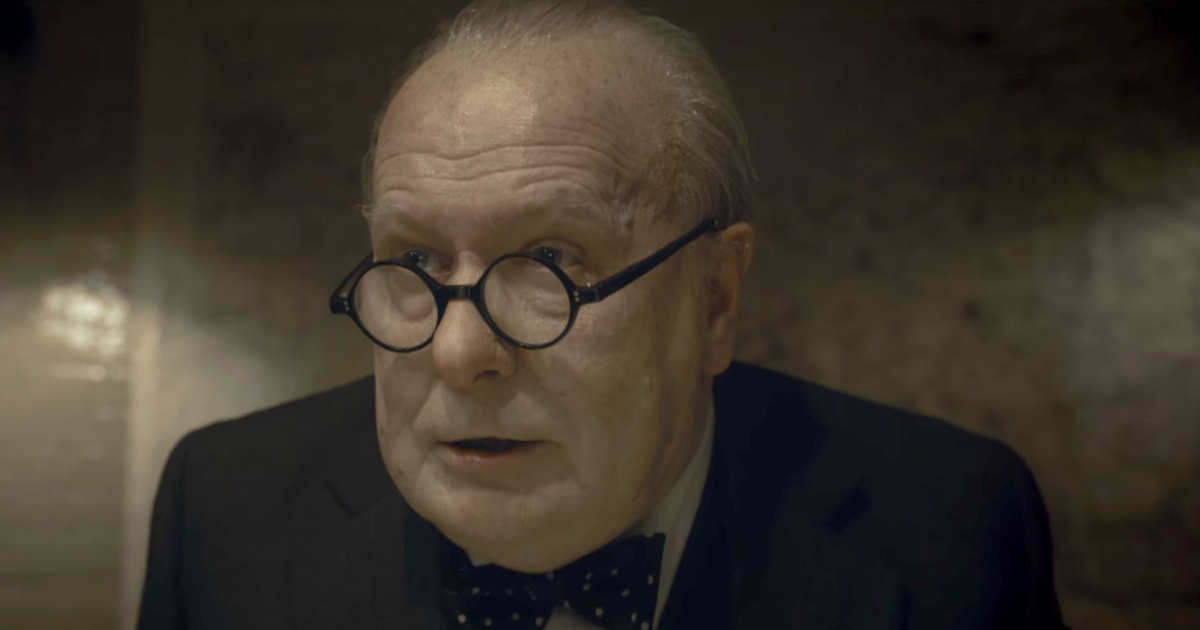
MPAA Rating: PG-13 | Rating: ★★★
Release year: 2017
Genre: Biography, Drama, History Director: Joe Wright
The other other Dunkirk film from 2017 (following Dunkirk and Their Finest), Darkest Hour lives up to its title not in terms of a despairing tone or grim content, but in its actual lighting. Natural sunlight pouring through windows cast long shadows; darkened rooms and hallways serve as the settings for key conversations; characters are often framed in silhouette. The aesthetic is one of a grey-toned fog of war, and a particularly British one. Writing this from the dark January days in Scotland, I can empathize.
Darkest Hour is one of the only films I can recall thinking might work better as a stage play. Apart from the few overhead and tracking shots, this is quite nearly a chamber drama, featuring characters walking in and out of darkly-lit rooms and hallways spouting off witty or emotive bits of dialogue. Every aspect of the film–the cinematography, the score, the production design–screams theatre; it’s all theatrics, in the best sense. Director Joe Wright continues what he began with Pride and Prejudice and continued in Atonement and Pan with his mythologizing of significant British cultural artifacts. In a similar biographical approach as Spielberg’s Lincoln, albeit with an entirely different directorial vision, Wright focuses on a short chapter in the life of Winston Churchill, namely the first weeks of his service as Prime Minister in the early days of WWII.
Darkest Hour‘s greatest strength is in its performances. Most notable is Gary Oldman as Winston Churchill. Already a dynamic and emotive actor, Oldman essentially disappears into the makeup and costumes, becoming the volatile, visionary PM in every mannerism. While I am not familiar enough to know whether the performance is accurate to Churchill’s nature, I can say that Oldman convinced me. It’s difficult to portray a real-life figure, where genuine acting--an artistic performance as a character–can quickly devolve into mere imitation or mimicry. I’m still flummoxed as to how Oldman has never won an Oscar before, as his range is impeccable. The man who was once Dracula, Chief Commissioner Gordon, George Smiley, Sirius Black, Sid Vicious, Zorg, and Stansfield can add “Churchill” to his list of identities. Whether Churchill is processing with his wife Clemmie (Kirsten Scott Thomas, who is always marvelous), barking orders to his secretary Elizabeth Layton (Lily James), or going toe-to-toe with royalty (Ben Mendelsohn in one of his first non-creepy roles), Oldman is in fine form.
What differs between this biopic and similar films–Lincoln, Selma, and The Queen come to mind–is its lack of psychological or emotional weight. I was more impressed with the theatrics than I was moved by them, more interested in the lighting of the rooms than the decisions being made in those rooms. We see Churchill make decisions and defend them, but we’re never certain as to *why* he’s so passionate about his position, or why we’re to be on his side and not with his political rivals’. Perhaps I lack some historical knowledge which would benefit understanding the machinations of British politics, but I shouldn’t have to–it’s a film about an island nation defending itself against the invading tyranny of the Nazis and I didn’t really feel anything. Whereas Dunkirk was all spectacle and mise-en-scene, and Their Finest was an affecting romantic dramedy (with Bill Nighy, who makes every film better), Darkest Hour was interesting without ever becoming evocative or thought-provoking for me. It’s a film which impresses but doesn’t linger in the mind or heart. I imagine in a decade’s time, Darkest Hour will be known as The Film That Won Gary Oldman His Oscar, and little more.
IMDB Listing: http://www.imdb.com/title/tt4555426/
Leave a Reply